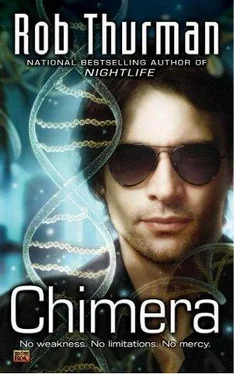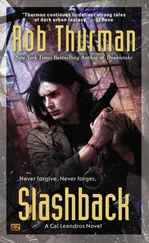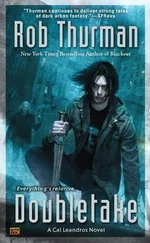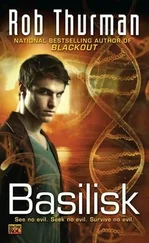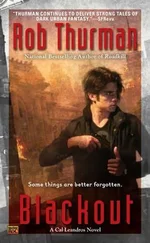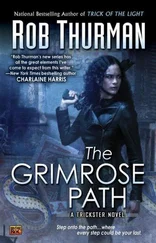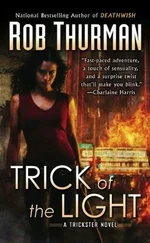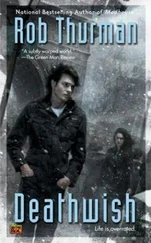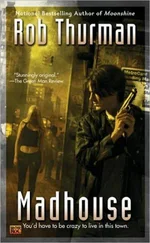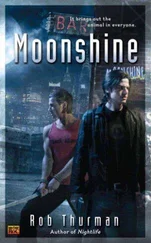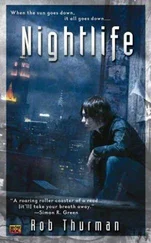“Did any of them have their babies before the project was blown open?” I shifted and leaned forward. This would’ve been nearly fifteen years ago. Had the first genetically altered chimeras been produced then?
He shook his head. “No. The farthest along was a woman at eight months. I never saw the results of John’s work.”
Until now, I thought, as Michael continued to follow our conversation with a blank face. What Jericho had learned to do to children before they took their first breath, he’d adapted to those already born natural chimeras . . . not yet genetically manipulated by a monster.
“What do you think happened to those children?”
“After they were born?” The intertwined fingers tightened on one another. “At best, nothing. At worst, congenital defects that would make thalidomide seem like party punch. Genetics, as a science, wasn’t yet advanced enough then that we could do even half of what John was attempting. It still isn’t. He thought he was a god. I’d never noticed that before. He was my friend and arrogant as hell, yes, yet I never noticed that he thought himself a god.” He paused and cleared a suddenly tight throat. “But I imagine those poor damn children proved him less a god and more a fiend. If they grew up capable of coherent thought or purposeful movement, I’d be surprised.”
I didn’t argue the label of monster; after all, I’d thought it many times myself. But Bellucci was less accurate with the rest of his assessment. Jericho hadn’t crippled his subjects, not physically or intellectually. There were other damages, to be sure, but for all that he was a monster, he was a monster who knew his business.
I closed my notebook. “No one has seen him since, have they?”
“No. He disappeared so very well that I have to wonder if he didn’t have some sort of help. That and the fact the majority of what happened was kept out of the papers.” The wide mouth thinned to a knife-edged gash. “And I was bound by a nondisclosure agreement. The university would’ve ruined me if I’d spoken up.” There was a broken-glass glitter behind his eyes. “Odd. I’ve kept quiet all these years; yet I still feel ruined. It hardly seems fair, does it? I wrote my articles, of course, refuting everything John ever theorized, but it wasn’t enough. It won’t ever be enough.”
“So why open up now?”
The question seemed to amuse him, but it was a bleak and dark humor. Lifting a hand, he tapped the base of his skull. “Brain tumor,” he said matter-of-factly. “Supratentorial glioma. I have six months . . . if I’m very, very lucky. There is little anyone could do to my life now that this rampaging package of cells hasn’t already done, nondisclosure agreements be damned.”
It made sense. He was stepping away from the game and wanted to clear his debts before he went. It was human nature. It was only too bad it wasn’t our nature to settle things before it was on the verge of being too late. “Two last questions, Dr. Bellucci, if I may.” Placing the mock notes into my jacket pocket, I asked, “Do you think if Hooker hadn’t been found out that he would’ve been able to do what he’d planned in the beginning? Do you think he could have gone on to substantially change the genes of a person after they were born?”
“Genetic replacement is a reality for us now.” He continued to unconsciously rub the juncture of his neck and skull. “Unfortunately, the amazing medical miracles we were so sure it would bring about have been accompanied by problems nearly as adverse as what we were trying to cure. As for John . . . normally, I would say his chances were low. What he was aiming for was worlds beyond what the scientific community is doing now. Still”—he dropped his hand and used it to make a throwaway gesture—“this is John we’re speaking of and that alone makes it almost conceivable. I’m not saying he would’ve accomplished any of his goals, mind you; they were far too improbable, not to mention insane. But I do believe if he’d continued on with the resources we had, he would’ve advanced genetic replacement considerably—in theory if nothing else.”
Insane and brilliant was a mix that hadn’t done the world any good throughout history. “Did Hooker have any government connections, contracts? He vanished, as you said, so thoroughly. I have to wonder if he had professional help.”
Once again he was out of the chair. This time it was to pull the drapes, squinting as if even the dull gray light hurt his eyes. “I wondered that myself, but truthfully I don’t have the slightest idea. Although it would be hard to imagine John voluntarily taking up with an organization with far more rules and regulations than academic research ever dreamed of.” He pressed a knuckle against his temple and gave a pained grimace.
The interview apparently over, I followed his lead and stood. “I appreciate your time. We can show ourselves out if you want.”
“No, no. I’m fine.” He moved over and shook my hand. “And I appreciate it far more. The chance to get this off my chest means quite a bit to me.”
We were nearly at the door when I remembered one more question I’d wanted to ask him. “Did Hooker have any family to speak of? Children maybe? A son?”
Michael had commented on how closely his John had resembled his namesake, Jericho, and I’d wondered if he had performed his twisted magic on his own blood. Had he tried to create an even darker version of himself?
“Son? No. John was an only child and had no other family after his parents died. He didn’t marry and had no children that I knew of. Not before he disappeared anyway. Why?”
“Just curious,” I answered somewhat truthfully. In the foyer a wet figure almost collided with us as it came through the front door wrestling with an umbrella and an armful of yapping dog.
“Gina.” Bellucci leaned in to take the white bundle of wet-dog smell away from what turned out to be a short, squat woman in a raincoat. “Let me help you.”
“Thank you, sir.” Stripping off her coat, she revealed no-nonsense black polyester pants paired with a plain white blouse. She was either a housekeeper or a nurse, although Bellucci didn’t seem to be in need of the latter yet. “Priscilla quite took her time with business. I’ll have to towel the little beast off.” After carefully wrapping both her umbrella and tightly folded coat in plastic bags she obtained from the top shelf of the closet, she reclaimed the still-barking dog and whisked it off. Not a single drop of water hit the floor during the process.
“Good help is hard to find,” Bellucci said ruefully. “But anal-retentive help is priceless.” He shook my hand again and let us out onto the porch. “Let me know when the article comes out, would you?”
I nodded. “Of course. As soon as I finish it and send it off, I’ll let you know.”
Eyes distant, he said quietly, “Hurry.” Then he closed the door, leaving us to the rain.
Protected from the weather by the overhang, Michael and I stood in silence until he finally said, “That was a lot of big words on your part. Are you okay?”
“My head hurts, but I’ll try to struggle on,” I replied dryly. Actually I was struggling, but it was in an effort to keep afloat above a wave of pessimism. What we had learned had given us something of a background on Jericho, but it hadn’t given us anything useful to our situation. The issue of government ties was still a mystery and Jericho had no family he might keep in contact with, which left us with no way to trace him. And while we did know now how it all began, we didn’t know the answer to the more important question.
How it would all end.
The beach house was mostly as I remembered. It was a little shabbier, with a few areas of peeling paint and warped wood, but otherwise it was the same. A sprawling affair on stilts, it looked identical to the majority of the houses up and down the coast. There was an outside shower to spray off the sand and salt and a deck with chairs of weathered wood to watch the sunrise over the dunes. The ocean itself was hidden behind those same swells of sand and could be seen only from the windows on the second floor. You could hear it, however, no matter where you were . . . inside or out. I’d spent the majority of my life listening to the sound. In many ways it had been one of the few constants. Maybe now I could learn to enjoy it again.
Читать дальше
